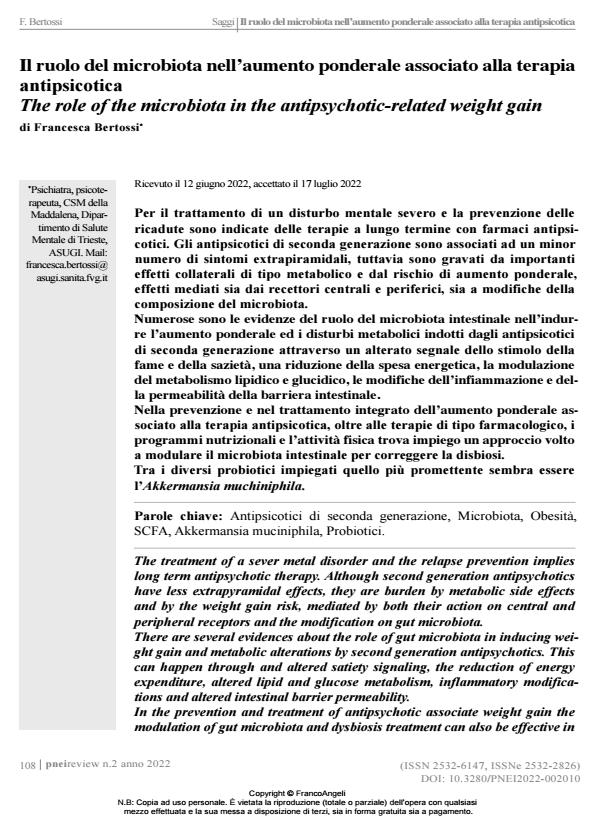Il ruolo del microbiota nell’aumento ponderale associato alla terapia antipsicotica
Titolo Rivista PNEI REVIEW
Autori/Curatori Francesca Bertossi
Anno di pubblicazione 2022 Fascicolo 2022/2
Lingua Italiano Numero pagine 15 P. 108-122 Dimensione file 117 KB
DOI 10.3280/PNEI2022-002010
Il DOI è il codice a barre della proprietà intellettuale: per saperne di più
clicca qui
Qui sotto puoi vedere in anteprima la prima pagina di questo articolo.
Se questo articolo ti interessa, lo puoi acquistare (e scaricare in formato pdf) seguendo le facili indicazioni per acquistare il download credit. Acquista Download Credits per scaricare questo Articolo in formato PDF

FrancoAngeli è membro della Publishers International Linking Association, Inc (PILA)associazione indipendente e non profit per facilitare (attraverso i servizi tecnologici implementati da CrossRef.org) l’accesso degli studiosi ai contenuti digitali nelle pubblicazioni professionali e scientifiche
Per il trattamento di un disturbo mentale severo e la prevenzione delle ricadute sono indicate delle terapie a lungo termine con farmaci antipsi- cotici. Gli antipsicotici di seconda generazione sono associati ad un minor numero di sintomi extrapiramidali, tuttavia sono gravati da importanti effetti collaterali di tipo metabolico e dal rischio di aumento ponderale, effetti mediati sia dai recettori centrali e periferici, sia a modifiche della composizione del microbiota. Numerose sono le evidenze del ruolo del microbiota intestinale nell’indur- re l’aumento ponderale ed i disturbi metabolici indotti dagli antipsicotici di seconda generazione attraverso un alterato segnale dello stimolo della fame e della sazietà, una riduzione della spesa energetica, la modulazione del metabolismo lipidico e glucidico, le modifiche dell’infiammazione e del- la permeabilità della barriera intestinale. Nella prevenzione e nel trattamento integrato dell’aumento ponderale as- sociato alla terapia antipsicotica, oltre alle terapie di tipo farmacologico, i programmi nutrizionali e l’attività fisica trova impiego un approccio volto a modulare il microbiota intestinale per correggere la disbiosi. Tra i diversi probiotici impiegati quello più promettente sembra essere l’Akkermansia muchiniphila.
Parole chiave:Antipsicotici di seconda generazione, Microbiota, Obesità, SCFA, Akkermansia muciniphila, Probiotici.
Francesca Bertossi, Il ruolo del microbiota nell’aumento ponderale associato alla terapia antipsicotica in "PNEI REVIEW" 2/2022, pp 108-122, DOI: 10.3280/PNEI2022-002010